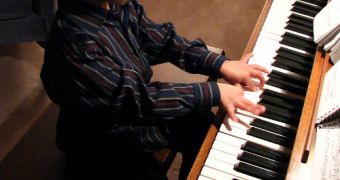The benefits of taking music lessons as a child become apparent even way later in life, show the preliminary results of a new study. Experts say that such lessons are well worth their cost, because they help people maintain their cognitive abilities for longer than peers who did not take music lessons.
What this study is proposing is that parents should consider the costs of teaching their kids a musical instrument as an investment for the future. Past investigations have hinted at this connection, but the new work demonstrates it rigorously.
Just to be clear, the conclusions show that musical training as a kid pays off later in life regardless of whether that person continues to play a musical instrument in adolescence, or during adulthood.
Researchers behind the work say that the thing that influences this correlation most is the length of the training. If it is applied when the kids are very young, around 3 or 4 years old, then they have the most noticeable effects.
This happens because, at that critical age, the young ones' brains are most malleable, and ready to accept influences from the exterior. The new investigation was carried out on 70 individuals, aged between 60 and 83.
All of these participants were divided into groups based on how much music experience they had, and were then subjected to a series of cognitive tests. Those who were classified as musicians performed consistently better over all ages.
“Musical activity throughout life may serve as a challenging cognitive exercise, making your brain fitter and more capable of accommodating the challenges of aging,” says Brenda Hanna-Pladdy, PhD.
“Since studying an instrument requires years of practice and learning, it may create alternate connections in the brain that could compensate for cognitive declines as we get older,” adds the expert, who was the lead researcher of the investigation.
“Based on previous research and our study results, we believe that both the years of musical participation and the age of acquisition are critical,” Hanna-Pladdy goes on to say, quoted by PsychCentral.
“There are crucial periods in brain plasticity that enhance learning, which may make it easier to learn a musical instrument before a certain age and thus may have a larger impact on brain development,” she concludes.

 14 DAY TRIAL //
14 DAY TRIAL //